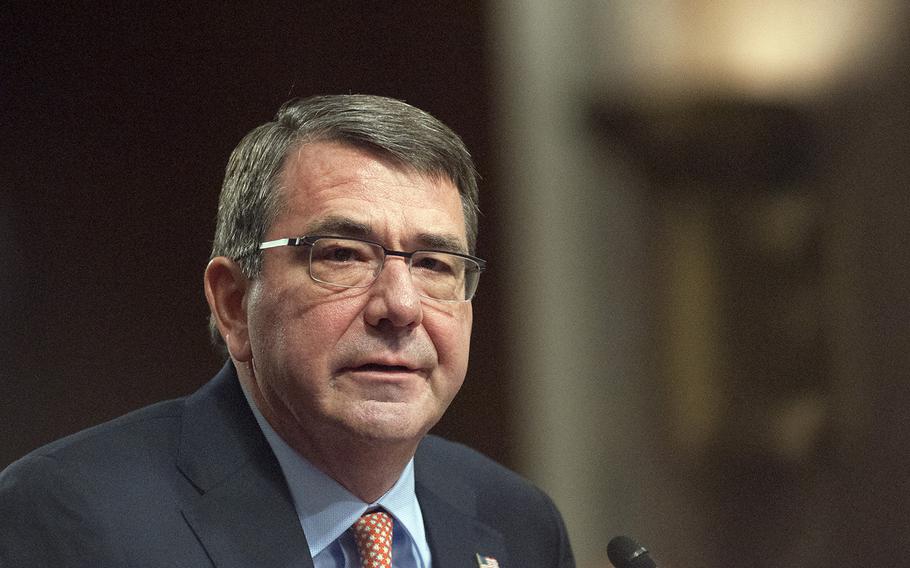
During a nomination hearing before the Senate Armed Services Committee on Wednesday, Feb. 4, 2015, on Capitol Hill in Washington, D.C., Defense Secretary nominee Ashton Carter told lawmakers that he would 'incline in the direction of providing' Ukrainian troops with lethal arms to combat Russian-backed rebels. (Carlos Bongioanni/Stars and Stripes)
WASHINGTON — Ashton Carter cleared the final hurdle to becoming the next secretary of defense Thursday, when the Senate approved his nomination by President Barack Obama by an overwhelming vote of 93-5. He will take the reins on Tuesday.
A simple majority is needed to confirm a Cabinet secretary nominee.
The lawmakers voting against Carter were: Sens. Roy Blunt, R-Mo.; John Boozman, R-Ark.; Mike Crapo, R-Idaho; Mark Kirk, R-Ill.; and James Risch, R-Idaho.
Carter’s confirmation seemed to be a foregone conclusion heading into the roll call. He has been widely praised by both Republicans and Democrats. Following a smooth confirmation hearing last week, the Senate Armed Services Committee voted 25-0 to send his nomination to the Senate floor.
His trouble-free confirmation process stands in sharp contrast to that of outgoing Secretary of Defense Chuck Hagel, who saw his nomination filibustered two years ago after a poor confirmation hearing performance. The former Army sergeant and Republican senator had previously made controversial remarks about Israel and other issues, which drew fire from lawmakers. Some senators even suggested that he had cozy ties with America’s adversaries.
When the final up or down vote took place in the Democrat controlled Senate, Hagel made it through 58-41, the narrowest margin of approval of any defense secretary in history. Only four Republicans voted to confirm Hagel.
With the GOP now in control of the legislative body, Republicans were in a position to sink Carter had they so chosen.
Carter’s margin of approval is not unprecedented for defense secretary nominees. Leon Panetta, Hagel’s predecessor, won unanimous approval. Robert Gates, Obama’s first secretary of defense and a holdover from the previous administration, was confirmed 95-2 after he was nominated by President George W. Bush in 2006.
Some outside observers are not thrilled about Carter taking over the Pentagon. The Project on Government Oversight, a watchdog group, decried his ties to the defense industry.
“While working in the private sector, he has held plum positions on government advisory boards that called for reforms with potential ramifications for his defense industry clients and other companies that receive [Department of Defense] dollars,” Michael Smallberg, a POGO investigator, wrote on the organization’s blog last month. “Carter’s nomination serves to illustrate how the government allows members of the policy establishment to straddle both sides, and how it’s become a fixture of the military-industrial-congressional complex.”
Unlike many of his defense secretary predecessors, who came from political backgrounds, Carter is a technocrat and policy wonk with a long track record at the Pentagon.
He was deputy secretary of defense from October 2011 to December 2013. Before that, he oversaw the buying of the military’s newest weapons systems and technologies, as undersecretary of defense for acquisition, technology and logistics. During the Clinton administration, he was assistant secretary of defense for international security policy.
Unlike Hagel, who saw extensive combat in Vietnam as an infantryman and received two Purple Hearts, Carter has never served in uniform.
When Obama announced Carter’s nomination, he praised him as someone who has shown a commitment to the well-being of the troops.
“When our troops in Iraq and Afghanistan were struggling to defend against roadside bombs,” Obama said, “he moved heaven and earth to rush them new body armor and vehicles. It’s no exaggeration to say that there are countless Americans who are alive today in part because of Ash’s efforts.”
Carter was tapped to be the next Pentagon chief in December, weeks after Hagel was pressured to resign by a White House that wanted someone else to tackle thorny foreign policy problems, most notably the war against the Islamic State group in the Middle East.
“I accepted [the nomination] because of the seriousness of the strategic challenges we face, but also the bright opportunities that exist for America if we can come together to grab hold of them,” Carter said at the White House on Dec. 5 after Obama announced that he had been chosen. “And I accepted the offer because of the deep respect and abiding love that [my wife] Stephanie and I have for our men and women in uniform.”
harper.jon@stripes.com Twitter: @JHarperStripes